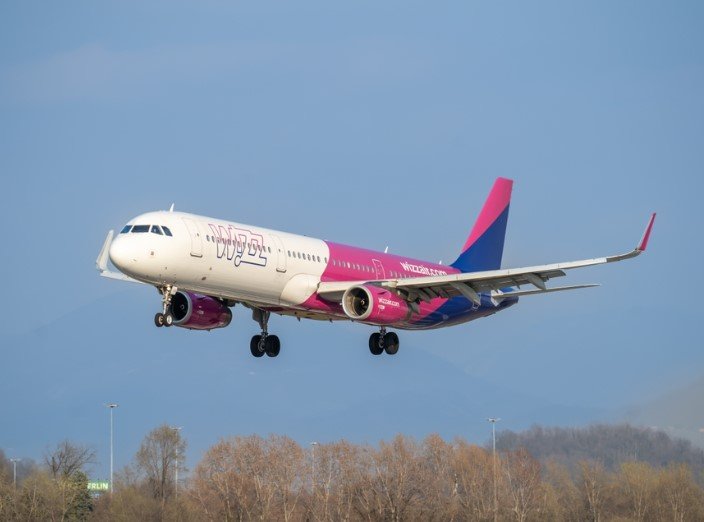Wizz Air will restart flights to Israel more than a month ahead of schedule, connecting Tel Aviv with nine cities across Europe and the Middle East starting August 8.
The low-cost airline is jumping back into the Israeli market with force, signaling a return to relative normalcy in the region’s airspace and a crucial revival for tourism and business travelers. It’s also a symbolic comeback for Wizz Air, whose bold pink planes have been absent from Ben Gurion Airport since the flare-up of conflict in June.
A Swift Comeback to a Turbulent Region
Wizz Air originally announced a September 15 restart for its Tel Aviv operations, but as tensions in the region have eased and skies reopened, the Hungarian carrier isn’t waiting. The new date—August 8—was confirmed this week, alongside the reopening of several major routes.
The company wasted no time opening bookings.
And if early demand is anything to go by, seats won’t last long. Tickets start at BGN 155.99 (about €80), and given Israel’s pent-up travel demand, the company expects flights to sell out fast.
“We are back – and we are back with a mission,” said Anastasia Novak, Wizz Air’s Corporate Sustainability and Communications Manager. She called the early relaunch a “commitment to our loyal Israeli customers.”

Which Cities Are Back on the Map?
The August relaunch will reconnect Tel Aviv with nine cities—each one a major business, tourism, or diaspora hub. This includes:
-
Sofia
-
London
-
Rome
-
Milan
-
Bucharest
-
Vienna
-
Larnaca
-
Iasi
-
Abu Dhabi
That’s just the start. In total, Wizz Air is planning to resume 24 routes connecting Tel Aviv to 11 countries. The 10 routes resuming in August will account for 31,000 seats ahead of mid-September.
One paragraph, one sentence.
The rest of the flights will follow on September 15 as initially scheduled.
Timing Is Everything for Wizz Air
This isn’t just about summer travel or fast ticket sales. Wizz Air’s move is as much about brand presence as it is about profit. With airspace closures loosening and other carriers still slow to return, Wizz has a window to take the lead.
According to the airline’s current schedule, it will become the largest foreign airline operating in Israel by capacity. That’s a big deal for an ultra-low-cost carrier that competes not just with legacy carriers but with each other.
The expansion is also part of Wizz Air’s larger strategy. The airline is betting big on Eastern and Central Europe, pushing its reach across non-traditional markets where cost-conscious travel is booming.
Here’s what Wizz Air’s updated Tel Aviv route schedule looks like:
| Route | Relaunch Date | Notes |
|---|---|---|
| Sofia – Tel Aviv | August 8 | Relaunched ahead of schedule |
| London – Tel Aviv | August 8 | Daily frequency expected |
| Rome – Tel Aviv | August 8 | High demand forecast |
| Bucharest – Tel Aviv | August 8 | Strategic for business travel |
| Milan – Tel Aviv | August 8 | Leisure + business mix |
| Abu Dhabi – Tel Aviv | August 8 | Gulf-Israel corridor reopens |
| Iasi – Tel Aviv | August 8 | Smaller market, key diaspora |
| Vienna – Tel Aviv | August 8 | Reconnecting Austria-Israel |
| Larnaca – Tel Aviv | August 8 | Popular weekend route |
Local Buzz: What Israelis Are Saying
Tel Aviv residents aren’t exactly new to conflict-induced flight cancellations. But the past few months were especially disruptive. Not just because of grounded planes, but because of the larger uncertainty that hung over the country’s airports.
For frequent fliers, Wizz’s return is a breath of fresh air.
“I’ve got family in London and Milan. I’ve been stuck. This changes everything,” said Nurit Gal, a Tel Aviv-based tech worker.
One sentence paragraph again.
Travel agencies across the country have already begun offering bundled Wizz packages for late August, hoping to cash in on early demand from Israelis eager to reconnect with Europe.
Competitive Pressure in a Crowded Sky
Wizz Air’s aggressive comeback will put pressure on other airlines dragging their feet on Israel routes. Ryanair, another budget giant, has yet to firm up its own restart schedule for Tel Aviv. Meanwhile, legacy players like Lufthansa and British Airways are operating on reduced frequencies.
That leaves a gap—especially for leisure and short-stay travelers—which Wizz is clearly aiming to fill.
But there’s more at stake here than a few summer seats. This is part of a larger chessboard where European carriers are positioning themselves for a post-conflict tourism rebound. Whoever gets in first grabs the loyalty—and the bookings.
-
Wizz Air plans to transport 75 million passengers by end of 2025, up from 60 million in 2024.
Wizz Air’s network currently includes more than 830 routes across 51 countries. While Western European hubs remain its bread and butter, it’s the Balkans and Middle East where it’s making bold plays.
A Shot of Confidence for Israel’s Tourism Sector
Wizz Air’s early return is more than a business move—it’s a shot of optimism for a battered tourism industry. For a country heavily reliant on international travel, even symbolic flights matter.
Hoteliers in Tel Aviv and Jerusalem are already reporting a pickup in bookings for the second half of August. Travel searches for “Tel Aviv flights” surged more than 40% within 24 hours of Wizz’s announcement, according to Google Trends data from Bulgaria and the UK.
The Israel Airports Authority hasn’t yet commented on the specifics, but analysts say the pace of reopening signals confidence.
Even so, there’s lingering unease. With elections around the corner and conflict never far away, airlines are hedging bets. But for now, Wizz Air seems willing to play offense.
